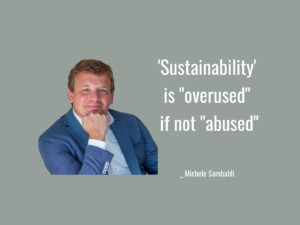Prof Valeria Minghetti on peer review, overtourism, regenerative tourism, and how to succeed
![Prof Valeria Minghetti on peer review, overtourism, regenerative tourism, and how to succeed 1 Professor Valeria Minghetti: "[B]e curious. Never stop asking yourself questions. Curiosity and the desire to find solutions is what makes a difference ..."](https://www.goodtourismblog.com/wp-content/uploads/2024/05/Professor-Valeria-Minghetti-1024x768.jpg)
“Never stop asking yourself questions. Curiosity and the desire to find solutions is what makes a difference,” according to Valeria Minghetti.
Such an attitude will take youngsters a long way in travel & tourism, she reckons.
And it must be redoubled at the very highest levels of academia and industry.
Saverio F Bertolucci interviewed Prof Minghetti for a Tourism’s Horizon Interview. For this “Good Tourism” Insight, Mr Bertolucci identifies his highlights. [The full transcript is on Substack.]
Table of Contents
Who is Professor Valeria Minghetti?
Professor Valeria Minghetti, Chief Research Director at CISET, the International Centre for Studies on Tourism Economics, Università Ca’ Foscari, Venice, Italy, represents the perfect convergence of academia and hospitality.
An established expert in economics and tourism development whose fields of expertise have grown to the point where there are almost no boundaries, Prof Minghetti’s academic career spans three decades and is a blend of many different knowledge dimensions, including information technology, transport, and micro- and macroeconomics.
Valeria has participated in many national and international conferences as well as contributed to projects led by the European Union and other international institutions.
She is currently a member of the scientific committees of BTO (Be Travel Online) and ENTER (the annual conference by the International Federation for IT and Travel & Tourism), and she sits on the editorial board of the Journal of Information Technology & Tourism.
It’s time to review the peer-review process
Valeria Minghetti’s content gatekeeping experience for industry events and journals lends weight to her concerns about the way ideas and opinions are perpetuated. She has long noticed how an alarming number of individuals exploit their self-proclaimed expertise to propose ideas without solid evidence.
Professor Minghetti asserts that while a culture of freedom of speech remains foundational to any truth-seeking endeavour, it can be exploited by those who wish to promulgate personal beliefs and ideology at the expense of truth; particularly in situations where there is no time and space given to good-faith criticism, open debate, and impartial peer review.
“There are often papers presented in tourism journals written by authors with non-tourism expertise, who use tourism as a mere field of experimentation to have one more opportunity to publish, without having real knowledge of the phenomenon. This can lead to banal or wrong conclusions, precisely because they do not have the elements to correctly interpret what their model analyses. It would be worth being more cautious about this.”
This raises the issue of alleged corruption in academia. It also highlights the need for a debate about the efficacy of peer-review processes.
On the other hand, Valeria notes that not all publications are poorly run; and that multidisciplinarity is crucial to studies of tourism due to the cross-cutting nature of the phenomenon. She points to an example highlighting the rich insights that can be gleaned from studying tourism through the lens of another field: Tourism, technologies and competitive strategies by Auliana Poon; one of the first works to analyse the relationship between information technology and tourism.
Overtourism: A function of space and time
“Generally, no destination suffers from total overtourism.”
Valeria Minghetti’s simple and direct statement sums up the unusefulness of the term ‘overtourism’. It can be replaced by ‘mismanagement’, which is usually calculated in space and time dimensions. In other words, excessive visitor inflows happen in specific periods and in specific areas but are not overwhelmingly present all year, and are not perceived as a problem by everyone.
Prof Minghetti says that much mismanagement happens in the early development stages of a destination, when it is first ‘discovered’ by travellers and word quickly spreads. That tourism might become and remain a net negative for host communities over the longer term is a function of wrongdoing or incompetence by policymakers and managers.
According to Valeria, the rapid democratisation of tourism through rising global economic and social prosperity has resulted in a boom in tourism demand from 100s of millions more people who heretofore never had the time nor resources for it. This has increased demand for established destinations and exposed new places to discovery too.
Unfortunately there have always been individuals who think that they can do whatever they want, wherever they want, with the consequent risk of conflict between citizens and visitors. With more travellers and tourists, there are more of them too. And they have reach and influence via the internet.
“There is often little or distorted knowledge […] of places and a lack of critical thinking behind one’s actions. In practice, digitisation, instead of creating a general benefit, ends up generating a negative effect on people’s behaviour.
“The awareness, on the part of potential visitors, of possible stressful situations (which would also be detrimental to their enjoyment) could generate different choices. Choices that, because of their nature, would not be definable as “limits” per se, in social terms. Not least because setting a limit is equivalent to […] defining a maximum access threshold, which can be easily identified for closed places (e.g., a museum), or bounded, such as an island or a park, but hardly for an open place, such as a city.”
The promise of regenerative tourism
Tourism growth has always been a potential positive, especially in places where tourism can be “the main driver of economic development”. The challenge is to “ensure an equitable distribution of the wealth derived from it at the local level”.
To this end, Valeria Minghetti thinks that the regenerative tourism trend is promising in that it moves “beyond the concepts of sustainability and responsibility to tourism that generates real local value and well-being” for all.
Prof Minghetti points to the Future of Tourism Coalition and its list of 13 core principles:
“Among them the importance of maintaining a general overview of destinations and their characteristics, which means including tourism in an overall destination development plan; aiming for quality over quantity of tourists attracted; redefining metrics for evaluating economic success; encouraging circular use of resources; limiting land consumption for tourism purposes; diversifying tourism demand; encouraging proximity tourism; [and] protecting a destination’s inner identity”.
The positive consequences of regenerative tourism do not stop there. Its “tourism for all” approach potentially maximises diversity in terms of not only visitors but also the tourism talents that cater to them; the latter sustained through an appropriate work/life balance.
Intuition, curiosity, science, and belief
Of course I had to ask such a wise and experienced figure how young talents may succeed in tourism.
Valeria Minghetti:
“Listen to your intuitions. Even if analytical thinking has been promoted [over] ‘gut feelings’, especially in [the West], intuition represents a different way to elaborate information. Sometimes our brain knows what is good for us before we are aware of it. This applies to your study and work choices, but also to the resolution of a problem […]
“Secondly, be curious. Never stop asking yourself questions. Curiosity and the desire to find solutions is what makes a difference […]
“Finally, if you are interested in working in tourism research and consultancy, remember that tourism by its nature is an applied science. […] Use scientific methods to find approaches [that help make] the tourism system more sustainable and competitive: do not use tourism just to test your theories.”
Valeria invites young talents, whatever their background and whoever they happen to be, to believe in themselves, challenge themselves, and to work towards a brighter future.
What do you think?
Share your own thoughts in a comment below. (SIGN IN or REGISTER first. After signing in you will need to refresh this page to see the comments section.)
Or write a “GT” Insight or “GT” Insight Bite of your own. The “Good Tourism” Blog welcomes diversity of opinion and perspective about travel & tourism, because travel & tourism is everyone’s business.
“GT” doesn’t judge. “GT” publishes. “GT” is where free thought travels.
If you think the tourism media landscape is better with “GT” in it, then please …
About the author
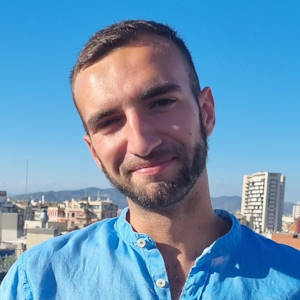
Saverio Francesco Bertolucci studied international tourism & leisure at Università di Bologna, Italy and sustainable tourism development at Aalborg University, Denmark.
Currently working as a commercial assistant with VDB Luxury Properties in Barcelona, Spain, the quadrilingual Italian is interested in destination management, the experience economy, and customer care, and has a passion for social sustainability, remote tourism, and co-creation.
About the Tourism’s Horizon Interviews
“Good Tourism” Insight Partner Tourism’s Horizon: Travel for the Millions, in collaboration with “GT”, has sought the candid views of well-known and respected experts on tourism’s past, present, and future.
The Tourism’s Horizon Interviews involves Jim Butcher, Vilhelmiina Vainikka, Peter Smith, Saverio Francesco Bertolucci, David Jarratt, and Sudipta Sarkar as interviewers. The “Good Tourism” Blog will publish their highlights and commentary as “GT” Insights.
Read the full transcripts of each interview on Tourism’s Horizon’s substack.


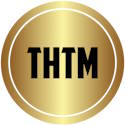
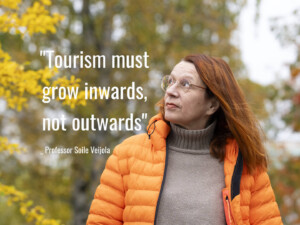
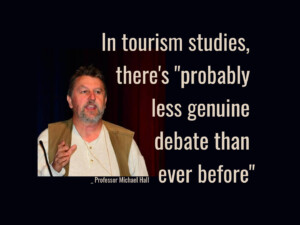
![Prof Valeria Minghetti on peer review, overtourism, regenerative tourism, and how to succeed 6 Professor Richard Butler on tourism’s challenges and academia’s inadequacies ... "[Don't] let wishful thinking take precedence over logic"](https://www.goodtourismblog.com/wp-content/uploads/2023/12/Prof-Richard-Butler-on-tourisms-challenges-and-academias-inadequacies-300x225.jpg)
